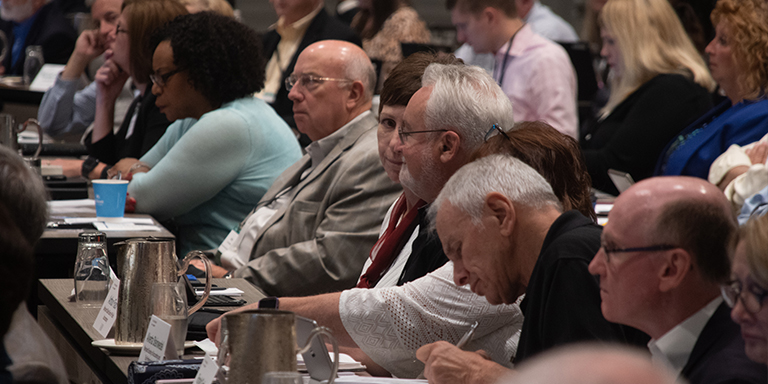Regionals Ponder CPA Evolution
SHARE:
The “Guiding Principles” for transforming the CPA profession to meet constantly escalating technological advances were the primary focus of the June 2019 NASBA Regional Meetings. On June 11-12 the Eastern Regional Meeting was held in Washington, DC, with 184 participants, and on June 18-20 the Western Regional Meeting was held in Salt Lake City, Utah, with 161 participants. State Board members from around the country were asked to voice their views on the Principles and how the cooperative efforts of NASBA and the AICPA should implement them.
“The disruption of professional services is already here,” Vice Chair Laurie Tish (WA) told the Western Regional Meeting, as she pointed to the IT-based services currently being offered by Legalzoom, Turbotax, Zelle and others. In the largest 100 US CPA firms, only 20 percent are CPAs, she noted. “We are trying to recognize technology is here and we need to bring it into the profession,” Ms. Tish stated. “Examination, education and experience are in our purview as regulators and we have to be sure our licensees are prepared to meet the future.”
NASBA Northeast Regional Director Catherine Allen (NY) reported on conclusions reached by the CPA Evolution Working Group, which she chaired. Its members were: Tom Broderick, Mark Dawkins, Clay Huffman (GA), Nancy Juron, Audrey Katcher, Rick Niswander, Todd Shapiro, Susan Somers (KS) and Michael Womble (NC). Their recommendations included staying with a single Uniform CPA Examination that would continue to be the same length as it is currently. As topics would be added to the Examination’s blueprints, others would be deleted, but the core CPA competencies would be covered. Changing the Examination will help to evolve required education. To do this, “We must become more nimble and look into new ways of conducting the practice analysis,” Ms. Allen said. “Many schools align their programs with the Examination, and many with market demand but, either way, we will change.“
To carry forward the Working Group’s suggestions, Vice Chair Tish and AICPA Vice Chair Bill Reeb worked with staff to develop the Guiding Principles. These continue to be finetuned, but the following were presented to the Regional Meetings.
NASBA’s Regional Directors reported their Regional Breakout Sessions were in agreement with most of the Principles; however, the State Boards’ representatives had some issues with the fourth Principle (as shown on page 1). Similar comments were raised at the Eastern Region’s Presidents’ Breakfast. NASBA President Ken Bishop explained: “We clearly hear that you do not want two pathways, but there are two distinct groups….What we are trying to get to is a process that not only attracts those in school but also those people who are already in firms. We have to think about how we get people with degrees in IT to become CPAs. “
A new website EvolutionOfCPA.org has been created with the AICPA to receive feedback on the Evolution project, as well as provide information on what is under consideration and address frequently asked questions.
At the Regional Meetings, Vice Chair Tish also reported on the task force reviewing the 150-hour education requirement, which she had led. The 120/150 Task Force members were: Jimmy Burkes (MS), Carlos Johnson (OK), Diane Medley (KY), Rick Reisig (MT), Dan Sweetwood (NE) and Kenya Watts (OH). Their recommendations included: The 150-hour education model should be maintained and supported, and its benefits need to be clearly articulated. Boards of Accountancy should focus on covering course content as described in the Uniform Accountancy Act, rather than on specific course work, to lead to greater consistency among the states’ requirements. Consideration needs to be given to adding content, such as technology, to the Uniform Accountancy Act’s education requirements.
Ms. Tish was asked how long it would take for the Evolution to be completed. She explained that there would need to be a “delicate balancing act” to layer technology into the education requirements but not to impact those candidates already in the pipeline.
“We don’t want it to take 7-10 years,” Vice Chair Tish said.
Forty years ago the profession and Boards considered how to bring liberal arts majors into the profession, Daniel Dustin, NASBA Vice President-State Board Relations, reminded the Eastern Regional Meeting. Some of the arguments for change that applied then could be applied now. He told the Boards NASBA is now in the phase of gathering and analyzing feedback on a similar project, and encouraged them to submit their comments on the Guidelines by August 9, 2019.
Guiding Principles:
1. The CPA profession must adapt quickly due to the technological disruptions in areas such as data analytics, robotics, artificial intelligence, and more. As such, the competencies, services and attitudes of CPAs need to continually evolve in order to protect the public interest.
2. The CPA profession and State Boards of Accountancy recognize that technological and analytical expertise are essential to performing assurance work, as well as the other services that are currently, or will be in the future, core to professional accounting.
3. The CPA profession and State Boards of Accountancy acknowledge that sustaining the profession and continued public protection require rethinking initial licensure requirements.
4. The profession, and therefore entry into the profession, must be redesigned to attract individuals with technological and analytical expertise. This includes non-CPA professionals whose technology and analytics skills are critical to the performance of assurance and other core services, as well as non-accounting major students. All must demonstrate minimum required competencies necessary to perform professional accounting services as a CPA.
5. The changes must be rapid, transformational and substantive without negatively impacting candidates in the pipeline.







